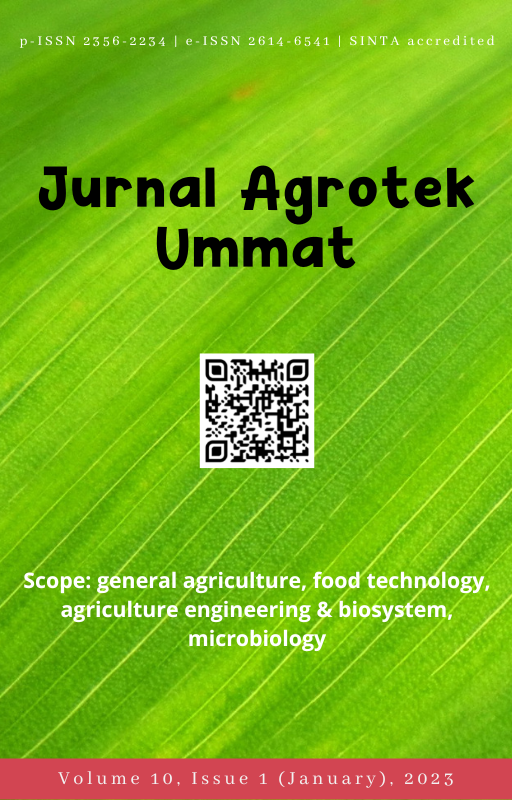Characteristics of bagasse briquettes using glutinous rice flour as adhesive
DOI:
https://doi.org/10.31764/jau.v10i1.12266Keywords:
bagasse, briquettes, glutinous rice flourAbstract
Energy requirements are increasing with the increased of human activities that use either fossil fuel or biofuel. Biomass can be utilised as an alternative energy source in the form of briquettes. This study aims to increase the utilization of bagasse through the manufacture of briquettes using glutinous rice flour as the adhesive. Research variables include moisture content, ash content, destruction index, burning time and calorific value. This study used a completely randomized design (CRD) with variations in the concentration of glutinous rice flour 20%, 30%, and 40%. The results showed that the water content ranged from 5.85% - 7.65%. Ash content ranged from 6.44 to 8.14%. The destruction index was 0.24 – 0.65%. the burning time was between 124.67 -155 minutes, and the calorific value produced from bagasse briquettes was 7069.8 – 9759.3 cal/gram. The calorific value tend to decreased as the concentration of the adhesive was increasedReferences
Abdulkareem, S., Hakeem, B. A., Ahmed, I. I., Ajiboye, T. K., Adebisi, J. A., & Yahaya, T. (2018). Combustion characteristics of bio-degradable biomass briquettes. Journal of Engineering Science and Technology, 13(9).
Adeleke, A. A., Odusote, J. K., Ikubanni, P. P., Olabisi, A. S., & Nzerem, P. (2022). Briquetting of subbituminous coal and torrefied biomass using bentonite as inorganic binder. Scientific Reports, 12(1), 1–11.
Badan Standardisasi Nasional. (2000). Standar Nasional Indonesia Briket Arang Kayu. Badan Standardisasi Nasional Indonesia, 1–4.
Dewi, R. P., Saputra, T. J., & Widodo, S. (2021). Studi Potensi Limbah Kulit Kopi Sebagai Sumber Energi Terbarukan Di Wilayah Jawa Tengah. Journal of Mechanical Engineering, 5(1).
Elfiano, E., Subekti, P., & Sadil, A. (2014). Analisa Proksimat dan Nilai Kalor pada Briket Bioarang Limbah Ampas Tebu dan Arang Kayu. Jurnal Aptek, 6(1).
Hiloidhari, M., Das, D., & Baruah, D. C. (2014). Bioenergy potential from crop residue biomass in India. In Renewable and Sustainable Energy Reviews (Vol. 32).
Lekahena, V. N. J. (2018). Tingkat Kesukaan Konsumen Terhadap Produk Permen Jelly Rumput Laut Dengan Penambahan Konsentrasi Tepung Beras Ketan. Agrikan: Jurnal Agribisnis Perikanan, 11(1).
Lubwama, M., & Yiga, V. A. (2017). Development of groundnut shells and bagasse briquettes as sustainable fuel sources for domestic cooking applications in Uganda. Renewable Energy, 111.
Lubwama, M., Yiga, V. A., & Lubwama, H. N. (2022). Effects and interactions of the agricultural waste residues and binder type on physical properties and calorific values of carbonized briquettes. Biomass Conversion and Biorefinery, 12(11).
Mariati, L., & Yusbarina, Y. (2017). Pembuatan Biobriket Dari Gambut Dan Ampas Tebu Sebagai Sumber Belajar Materi Ilmu Kimia Dan Peranannya. Konfigurasi : Jurnal Pendidikan Kimia Dan Terapan, 1(1).
Maryono, Sudding, & Rahmawati. (2013). Pembuatan dan Analisis Mutu Briket Arang Tempurung Kelapa Ditinjau dari Kadar Kanji. Jurnal Chemica, 14(1).
Mousa, E., Ahmed, H., & Söderström, D. (2022). Potential of Alternative Organic Binders in Briquetting and Enhancing Residue Recycling in the Steel Industry. Recycling, 7(2), 1–17.
Sandri, D., & Hadi, F. S. (2017). Optimasi Bentuk Dan Ukuran Arang Dari Kulit Buah Karet Untuk Menghasilkan Biobriket. Jurnal Teknologi Agro-Industri, 3(2).
Shiami, M. A., & Mitarlis. (2014). Pembuatan Briket Dari Campuran Blotong Dan Limbah Padat Proses Sintesis Furfural Berbahan Dasar Ampas Tebu Preparation. Journal of Chemistry, 3(3), 104–110.
Wahyudi, Y., Amrullah, S., & Oktaviananda, C. (2022). Uji Karakteristik Briket Berbahan Baku Bonggol Jagung Berdasarkan Variasi Jumlah Perekat. Jurnal Pengendalian Pencemaran Lingkungan, 4(2), 84–90.
Zhang, G., Sun, Y., & Xu, Y. (2018). Review of briquette binders and briquetting mechanism. In Renewable and Sustainable Energy Reviews (Vol. 82).
Downloads
Published
Issue
Section
License
Authors who publish articles in Jurnal Agrotek Ummatagree to the following terms:- Authors retain copyright of the article and grant the journal right of first publication with the work simultaneously licensed under a CC-BY-SA or The Creative Commons Attribution–ShareAlike License.
- Authors are able to enter into separate, additional contractual arrangements for the non-exclusive distribution of the journal's published version of the work (e.g., post it to an institutional repository or publish it in a book), with an acknowledgment of its initial publication in this journal.
- Authors are permitted and encouraged to post their work online (e.g., in institutional repositories or on their website) prior to and during the submission process, as it can lead to productive exchanges, as well as earlier and greater citation of published work (See The Effect of Open Access).

